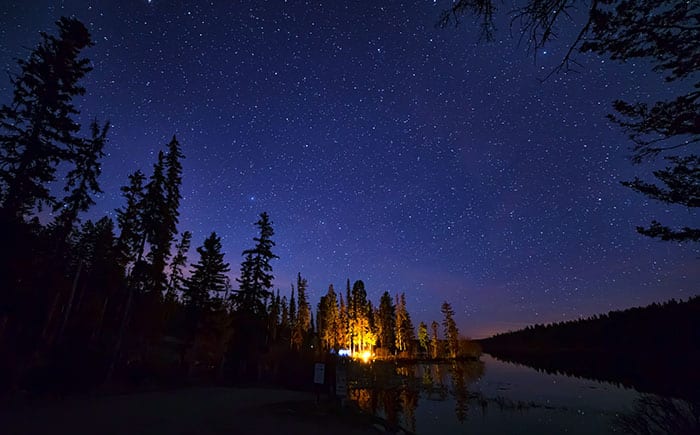Camping is a great way to escape the grind of day-to-day life and explore nature with your loved ones. That’s why millions of people opt to spend some of their vacation time out in nature every year. Going camping can seem a bit intimidating for beginners, kind of like being at the bottom of a mountain and staring up at the top.

Luckily, there’s plenty of easy-to-find information about the basics of what to pack, how to stay safe, and how to plan your trip that can make you feel much more prepared for your outdoor adventure.
What Should I Bring on My Camping Trip?
- A Checklist for the Best Camping Trip: This page contains details about what to consider while packing, things you’ll need for your campsite, and keeping the local activities and wildlife in mind.
- Wilderness Camping List: Using this checklist will make it easy to keep track of everything that needs to be packed to have a comfortable and safe camping trip.
- What Is the Right Order in Which to Buy Camping Gear? Camping gear is essential for a safe trip, and if you’ve never camped before, it’s important to purchase the essentials before getting any extra comfort items.
- Tips for Choosing the Right Camping Tent: No matter what season you plan to go camping in, a good tent is a must. Here are some tips that should make the process of finding the right tent easier.
- What to Wear When Camping: Packing clothing for any trip requires thought and consideration, but camping can require some special attire to keep you comfortable and safe.
- A Complete Guide to the Best Camping Clothes: Choosing the right clothes for camping is vital because you need something that protects your skin from sunburn, mosquitoes, and other bugs.
- The Ultimate Camping Checklist for a Weekend Outdoors: This camping checklist has all of the essentials necessary for your trip as well as some examples of extra things you may want to have on hand just in case.
- How to Choose the Right Hiking Shoes: Not only are camp clothes important, but good-quality shoes are a necessity.
- Winter Camp Packing List: Camping in different seasons may require different supplies, especially in the winter.
- Outerwear to Shield You From the Rain: Even if you plan everything perfectly, the weather does not always cooperate with you, so having rain gear while camping is very important.
Camping Safety
- Camping Tips: No matter what kind of camping trip you’re planning to take, there are plenty of ways to ensure that you have a fun and safe experience.
- Camping Safety Rules for Kids: Camping is an adventure and a chance for families to bond and learn in a new environment, as long as they’re also taught to follow some important safety rules for camping.
- What to Know About Camping Safety: While nature is beautiful, it can also be dangerous if you’re not fully prepared for your camping trip.
- Personal Safety While Camping: Protecting yourself and your loved ones must be a priority when you’re out in nature.
- Four Camping Safety Tips for a Safe and Fun Trip: Spending time in the great outdoors can be challenging and beautiful all at once. When you’re prepared for your trip, you can spend more time enjoying your relaxing surroundings.
- Essential Safety Items to Pack While Going Camping: This list of safety items is essential to pack in your backpack when you’re getting ready to go camping.
- Eight Tips for Camping Safety: Maximize your outdoor time during the summer by going camping, and then maximize your enjoyment of that time by following these safety tips.
- Camping Safety Fact Sheet: There are always risks involved with camping, no matter what level of comfort you enjoy. Thousands of people every year visit the doctor for camping-related injuries, but these safety tips can make it less likely that you’ll be part of that statistic.
- Camping Health and Safety Tips: These tips for camping health and safety are paramount for keeping you and everybody around you safe.
- Food Safety and Camping: Keeping yourself safe is important, but part of that is keeping your food safe. Always ensure that animals can’t get into your food and that your food is stored correctly so you don’t get sick.
General Wilderness Safety
- Fire Safety When Camping: People cause most wildfires, so it’s important to remember that we should all do our part to prevent fires while camping.
- Hike Smart: It’s important to know your limits, plan out your hike, pack smart, and be careful while on your hike so you’re less likely to deal with an injury or other safety issue.
- Camping First Aid Kit Checklist: This checklist for camping first aid can be printed out, saved as a PDF, or directly edited so you can cross off first aid essentials as you pack them for your trip.
- Camping Safety Tips: Camping safety doesn’t start when you arrive at the campsite. You can start preparing yourself to stay safe by doing some research into your campground before you go.
- The Seven Principles of Leave No Trace: The seven principles of Leave No Trace provide an easy-to-follow framework for how to minimize human impact on the outdoors.
- How to Avoid Wild Animal Encounters: When visiting the great outdoors, you’re visiting the home of wild animals, so it’s important to be respectful and lessen the impact on their home.
- Campfire Safety: There’s nothing like sitting around a fire roasting marshmallows and telling stories, but campfire mishaps can cause injuries to you and your loved ones if you’re not careful.
- What to Bring and Do for Camping First Aid: Know the basics of first aid for your trip and what you should bring so you’re prepared for anything that may pop up.
- Hiking Safety: Learn the essentials you need to pack for a hike and common mistakes that others make when they head out on the trail.
- Expert Tips for Camping With Wildlife: Naturalist David Mizejewski has prepared these tips for keeping yourself and wildlife safe while camping.
Miscellaneous Camping Tips
- When camping, always make sure to wear durable clothing made of quick-drying materials. Choose polyester blends or merino wool over moisture-absorbing textiles like denim or cotton.
- Choose the right camping style for you. Some people prefer to camp in a tent, while others prefer to camp in their car, RV, or trailer. Some may even prefer more primitive camping where there are no restrooms or running water nearby. Determine which works best for you and those who are going with you.
- Before you book a reservation at a campground, take the time to research the best time to go. Look at the typical local weather around that time to ensure that you’ll be comfortable.
- Store your gear in clear bins so you can see what’s in every bin without having to take everything out to find something. You should have separate bins for kitchen gear, clothes, sleep gear, and other accessories.
- Always keep your food in resealable bins and containers so you don’t attract bugs and other critters to your campground.
- Practice setting up your tent at home, especially if you plan to set it up alone, so you know exactly what to do when you get to your campground.
- Always check your supplies before you go, especially your headlamp or lantern. The last thing you want is to get to the campground and find out that your lamp’s batteries are dying and you don’t have any spares.
- Set up your camp while it’s still light out. It’s much harder to get everything done after the sun goes down. Most campgrounds allow you to check in around early afternoon. Expect that setup could take about 30 minutes, and keep that in mind when planning your arrival time.
- Plan your meals before you go, then prep as many ingredients as you can ahead of time by chopping veggies, marinating meat in a zip-top bag, and setting aside spice blends in smaller bags so you can just mix everything together when it’s time to cook.
- Always use local firewood. Firewood from different areas can potentially host invasive insects that could harm local plant life.



